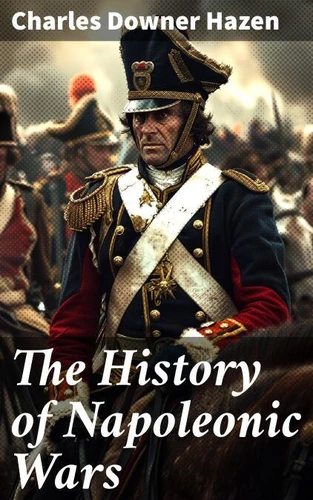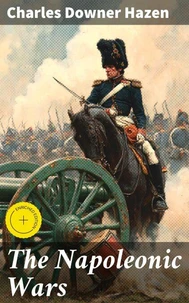The History of Napoleonic Wars. Unveiling the Epic Conflict of Napoleon's Reign
Par :Formats :
Disponible dans votre compte client Decitre ou Furet du Nord dès validation de votre commande. Le format ePub est :
- Compatible avec une lecture sur My Vivlio (smartphone, tablette, ordinateur)
- Compatible avec une lecture sur liseuses Vivlio
- Pour les liseuses autres que Vivlio, vous devez utiliser le logiciel Adobe Digital Edition. Non compatible avec la lecture sur les liseuses Kindle, Remarkable et Sony
 , qui est-ce ?
, qui est-ce ?Notre partenaire de plateforme de lecture numérique où vous retrouverez l'ensemble de vos ebooks gratuitement
Pour en savoir plus sur nos ebooks, consultez notre aide en ligne ici
- Nombre de pages75
- FormatePub
- ISBN859-65--4778471-5
- EAN8596547784715
- Date de parution20/12/2023
- Protection num.Digital Watermarking
- Taille592 Ko
- Infos supplémentairesepub
- ÉditeurGOOD PRESS
Résumé
In "The History of Napoleonic Wars, " Charles Downer Hazen meticulously chronicles the multifaceted campaigns led by Napoleon Bonaparte that reshaped Europe at the turn of the 19th century. Hazen'Äôs scholarly approach combines rigorous analysis with engaging narrative, providing readers with a thorough examination of not only the battles and military strategies but also the sociopolitical contexts that influenced them.
His work is characterized by a clear prose style that elucidates complex historical events, making them accessible yet profound. Positioned within the broader framework of European history, this text offers critical insights into the causes and ramifications of the Napoleonic Wars, aligning with contemporary historical discourse focused on the interplay between leadership and national identity. Charles Downer Hazen, an eminent historian and educator, was deeply influenced by the cultural and ideological upheavals of his time.
His academic background in history, coupled with his keen interest in political dynamics, inspired him to explore the lasting impact of Napoleon'Äôs ambitions on Europe. Hazen's extensive research and his commitment to contextualizing historical narratives have solidified his reputation as a significant voice in the field of historical scholarship. I highly recommend "The History of Napoleonic Wars" to anyone engaged in the study of military history or European studies.
Hazen'Äôs work not only enriches our understanding of a pivotal era but also invites readers to reflect on the intricate connections between warfare, politics, and society. It is a compelling read for both scholars and general readers seeking a comprehensive understanding of Napoleon'Äôs legacy.
His work is characterized by a clear prose style that elucidates complex historical events, making them accessible yet profound. Positioned within the broader framework of European history, this text offers critical insights into the causes and ramifications of the Napoleonic Wars, aligning with contemporary historical discourse focused on the interplay between leadership and national identity. Charles Downer Hazen, an eminent historian and educator, was deeply influenced by the cultural and ideological upheavals of his time.
His academic background in history, coupled with his keen interest in political dynamics, inspired him to explore the lasting impact of Napoleon'Äôs ambitions on Europe. Hazen's extensive research and his commitment to contextualizing historical narratives have solidified his reputation as a significant voice in the field of historical scholarship. I highly recommend "The History of Napoleonic Wars" to anyone engaged in the study of military history or European studies.
Hazen'Äôs work not only enriches our understanding of a pivotal era but also invites readers to reflect on the intricate connections between warfare, politics, and society. It is a compelling read for both scholars and general readers seeking a comprehensive understanding of Napoleon'Äôs legacy.
In "The History of Napoleonic Wars, " Charles Downer Hazen meticulously chronicles the multifaceted campaigns led by Napoleon Bonaparte that reshaped Europe at the turn of the 19th century. Hazen'Äôs scholarly approach combines rigorous analysis with engaging narrative, providing readers with a thorough examination of not only the battles and military strategies but also the sociopolitical contexts that influenced them.
His work is characterized by a clear prose style that elucidates complex historical events, making them accessible yet profound. Positioned within the broader framework of European history, this text offers critical insights into the causes and ramifications of the Napoleonic Wars, aligning with contemporary historical discourse focused on the interplay between leadership and national identity. Charles Downer Hazen, an eminent historian and educator, was deeply influenced by the cultural and ideological upheavals of his time.
His academic background in history, coupled with his keen interest in political dynamics, inspired him to explore the lasting impact of Napoleon'Äôs ambitions on Europe. Hazen's extensive research and his commitment to contextualizing historical narratives have solidified his reputation as a significant voice in the field of historical scholarship. I highly recommend "The History of Napoleonic Wars" to anyone engaged in the study of military history or European studies.
Hazen'Äôs work not only enriches our understanding of a pivotal era but also invites readers to reflect on the intricate connections between warfare, politics, and society. It is a compelling read for both scholars and general readers seeking a comprehensive understanding of Napoleon'Äôs legacy.
His work is characterized by a clear prose style that elucidates complex historical events, making them accessible yet profound. Positioned within the broader framework of European history, this text offers critical insights into the causes and ramifications of the Napoleonic Wars, aligning with contemporary historical discourse focused on the interplay between leadership and national identity. Charles Downer Hazen, an eminent historian and educator, was deeply influenced by the cultural and ideological upheavals of his time.
His academic background in history, coupled with his keen interest in political dynamics, inspired him to explore the lasting impact of Napoleon'Äôs ambitions on Europe. Hazen's extensive research and his commitment to contextualizing historical narratives have solidified his reputation as a significant voice in the field of historical scholarship. I highly recommend "The History of Napoleonic Wars" to anyone engaged in the study of military history or European studies.
Hazen'Äôs work not only enriches our understanding of a pivotal era but also invites readers to reflect on the intricate connections between warfare, politics, and society. It is a compelling read for both scholars and general readers seeking a comprehensive understanding of Napoleon'Äôs legacy.













